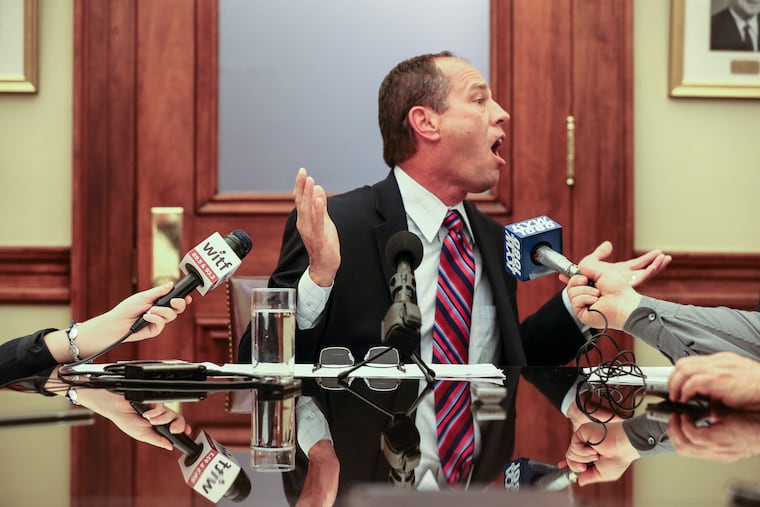The Catholic Church owns the Pa. Capitol. Abuse victims saw that Wednesday night. | Maria Panaritis
The Catholic Church won yet another battle against clergy abuse lawsuits in Pennsylvania. Perhaps the time has come to hang a portrait of the pope inside the state Capitol.

HARRISBURG — For three long days inside the Capitol here, as the hopes of clergy-abuse victims hung in the balance, there was anticipation and angst amid the magnificent murals, white marble pillars, gold-leaf-painted arches, and soaring dome inspired by none other than St. Peter's Basilica in Rome.
Victims, lobbyists, lawmakers, and reporters scurried through this churchlike sanctuary of democracy, high on a hill with a view of the Susquehanna River. It is a place that belongs to the people.
But on Wednesday night, it was very much the property of the Catholic Church.
For the second time in two years, Republican Senate leaders delivered a reprieve to the church instead of full justice to its victims. The Senate left on their last voting day of the year without taking action on a bill that sought to allow survivors of clergy abuse to sue the church.
They did so despite multiple grand jury reports of how bishops concealed and covered up priest abuse against children in all eight of Pennsylvania's Roman Catholic dioceses.
They did so only hours before news broke, on Thursday, that the U.S. Justice Department has dropped subpoenas on all eight of Pennsylvania's dioceses, from Philadelphia to Pittsburgh.
And the controlling party in the Senate did so with no apologies from the man who has led the charge to protect the church twice since 2016, Republican President Pro Tempore Joe Scarnati.
Scarnati tried, and failed, to push through a version of a bill that would have barred victims from suing the church.
Afterward, at a Capitol news conference just before midnight, he explained that this somehow made him a champion of victims.
"My amendment does not let any organization, including the church, off the hook," Scarnati insisted.
His failed measure would have invited dioceses to voluntarily pay into a compensation fund "to make right their horrific sins of the past." But it would have allowed lawsuits only against priests, some of whom take a vow of poverty.
I asked Scarnati to rebut criticism that he and other Republicans in the Senate appear beholden to the lobbying might of the church and the insurance industry.
Scarnati's response: He blamed victims and the very attorney general whose investigators have worked together to bring the church's vast horrors to light in recent years.
"Victims in this building," Scarnati said from a gleaming wooden conference table inside his office, "are politically motivated right now. The victims in this building are being victimized for politics."
The church isn't getting its way this year as bloodlessly as it had, time and again, since the Boston archdiocesan scandal in 2002 triggered calls for a change to Pennsylvania law so that adult victims could sue the church.
Two years ago, Scarnati helped the Senate swiftly dispose of a retroactive civil statute-of-limitations bill that had passed overwhelmingly in the House.
This year, though, as the House sent the Senate a similar proposal to give victims a two-year window to sue, there was no automatic kill button available to senators.
Many Republican senators are facing tough midterm election contests next month against insurgent Democrats.
Also adding momentum to victim efforts: the grand jury report made public in August by Attorney General Josh Shapiro. It found cover-ups of abuse by roughly 300 priests involving more than 1,000 victimized children in six of eight dioceses in Pennsylvania.
Victims have been in the Capitol in droves visiting lawmakers. It's unusual. And it has been a threat to church and insurance lobbyists, whose job is to know and influence every corner of this place.
Scarnati, clearly, has not welcomed the new dynamic. In his late-night news conference Wednesday — in which he addressed us with raspy-voiced frustration — Scarnati insisted that victims back in his district are different from the ones who have roamed the halls of the Capitol.
"They want to heal," he said of those child rape survivors who have not made the grueling trek to the Harrisburg offices of Republican heavyweights such as Scarnati and Senate Majority Leader Jake Corman. "They want to start a process to heal."
For those victims, Scarnati suggested, healing comes in the form of a compensation fund instead of taking the church to court before an impartial judge and jury.
I told the senator that many victims don't want the legislature to make that decision for them.
"Is that a question or is that your opinion?" he shot back at me.
This is what I've heard in 15 years, on and off, of speaking to victims as a journalist in Philadelphia, I replied.
"And I've tried to make a decision for them," he said. "I have tried harder than anybody."
As of Thursday morning, with the bill dead on the Capitol floor, all that trying by the powerful senator had rewarded, most handsomely, the Catholic Church.
It still cannot be sued.